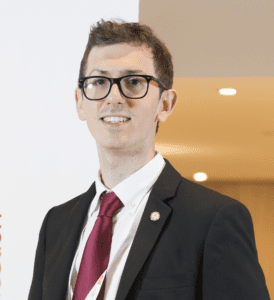Berkeley Haas doctoral student Matteo Tranchero has been awarded the Emergent Thought Award as part of the inaugural Panmure House Prize, one of the U.K.’s largest academic prizes.
Named after the eighteenth-century Scottish economist Adam Smith’s final Edinburgh home, the Panmure House Prize recognizes research that will lead to increased flows of capital to innovation—in the hope of finding the next Tesla, Amazon or pharma star, according to the press release. It is administered by Edinburgh Business School at Heriot-Watt University in partnership with investment consultancy FCLTGlobal, and funded by Baillie Gifford over five years, with the aim of encouraging the long-term funding of innovation in the spirit of Smith.

The main prize of $75,000 was awarded to a team led by associate professor Rachelle C. Sampson at the Robert H. Smith School of Business. In an eleventh-hour decision after reviewing proposals, the judging panel decided to add a second, $25,000 award for emergent thought to Tranchero, a student in the Berkeley Haas Management of Organizations group.
Tranchero is studying the role that data plays in innovation. His dissertation will focus on the U.S. pharmaceutical industry ecosystem, where data-intensive genetic research was fundamental to ensure the quick development of the Moderna, BioNTech-Pfizer, and Johnson & Johnson Covid-19 vaccines.
“My theory is that transformative change is quite like losing your keys at night. We tend to start looking in the areas where we can see more easily—such as in the lamp light—even though we quickly see the keys aren’t there and it slows down the search,” Tranchero said. “Looking in the dark areas is harder but promises a greater reward, and it’s there that innovation needs support. I hope my research will show that rewarding risky explorations that have a high chance of failure, rather than searching in well-trodden areas, is a means of unlocking more breakthrough innovation.”
Tranchero’s dissertation advisors include by Prof. Toby Stuart, Prof. Enrico Morretti, Asst. Prof. Abhishek Nagaraj, and Prof. Lee Fleming, director of the Coleman Fung Institute for Engineering Leadership.
“Matteo has looked at an emerging method of innovation, built a novel dataset, and uncovered some provocative implications,” Fleming said. “It will be exciting to see him carry the work through to fruition.”